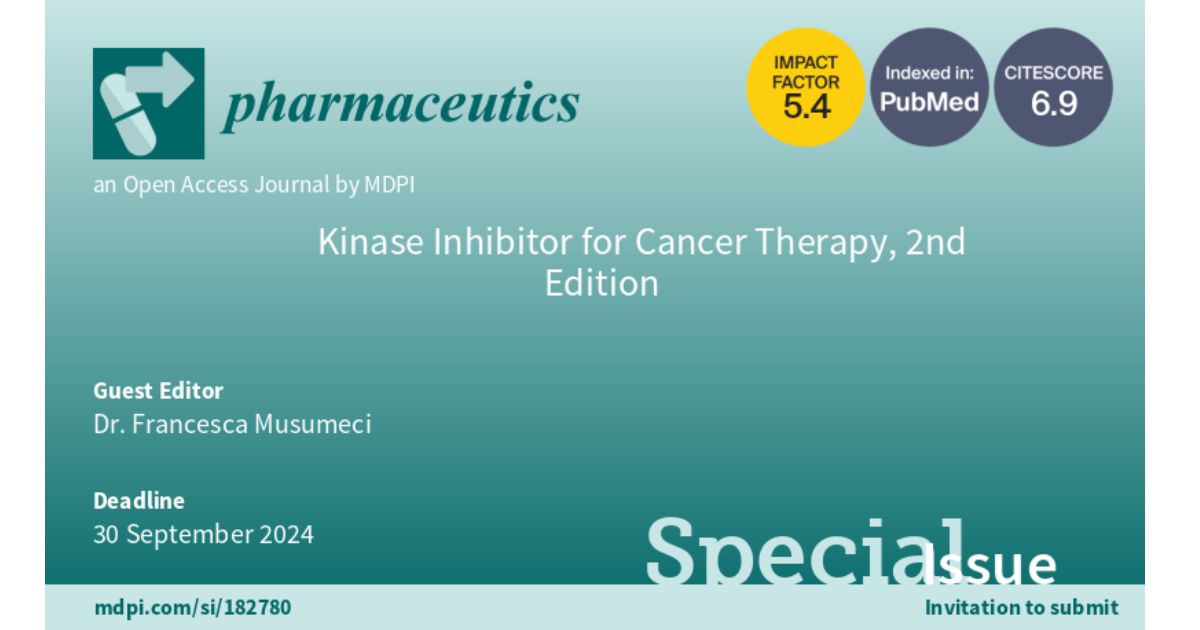Kinase Inhibitor for Cancer Therapy, 2nd Edition
A special issue of Pharmaceutics (ISSN 1999-4923). This special issue belongs to the section "Drug Targeting and Design".
Deadline for manuscript submissions: 30 September 2024 | Viewed by 1350

Special Issue Editor
Interests: pyrazolo[3,4-d]pyrimidines; kinase inhibitors; anticancer agents; small molecules
Special Issues, Collections and Topics in MDPI journals
Special Issue Information
Dear Colleagues,
Cancer is one of the leading causes of death worldwide, and still, considerable effort is needed to make this pathology curable. Despite the limits of available approaches, kinase inhibitors have marked a turning point in the treatment of different types of tumors. This class of compounds has been the first oral targeted therapy approved for neoplasia, and about 30 compounds have entered the market in the last five years. Kinase inhibitors include small molecules and monoclonal antibodies and are endowed with fewer side effects than classical antitumor agents. The potential for application of this class of drugs is still huge, and this Special Issue focuses on the discovery and development of kinase inhibitors in terms of in silico studies, synthesis and identification of new compounds, drug delivery, formulation studies, and biological and pharmacokinetic evaluation.
In this Special Issue, original research articles and reviews are welcome.
I look forward to receiving your contributions.
Dr. Francesca Musumeci
Guest Editor
Manuscript Submission Information
Manuscripts should be submitted online at www.mdpi.com by registering and logging in to this website. Once you are registered, click here to go to the submission form. Manuscripts can be submitted until the deadline. All submissions that pass pre-check are peer-reviewed. Accepted papers will be published continuously in the journal (as soon as accepted) and will be listed together on the special issue website. Research articles, review articles as well as short communications are invited. For planned papers, a title and short abstract (about 100 words) can be sent to the Editorial Office for announcement on this website.
Submitted manuscripts should not have been published previously, nor be under consideration for publication elsewhere (except conference proceedings papers). All manuscripts are thoroughly refereed through a single-blind peer-review process. A guide for authors and other relevant information for submission of manuscripts is available on the Instructions for Authors page. Pharmaceutics is an international peer-reviewed open access monthly journal published by MDPI.
Please visit the Instructions for Authors page before submitting a manuscript. The Article Processing Charge (APC) for publication in this open access journal is 2900 CHF (Swiss Francs). Submitted papers should be well formatted and use good English. Authors may use MDPI's English editing service prior to publication or during author revisions.
Keywords
- kinase inhibitor
- cancer
- targeted therapy
- small molecule
- monoclonal antibody
- drug delivery
- formulation studies
Related Special Issue
- Kinase Inhibitor for Cancer Therapy in Pharmaceutics (23 articles)






